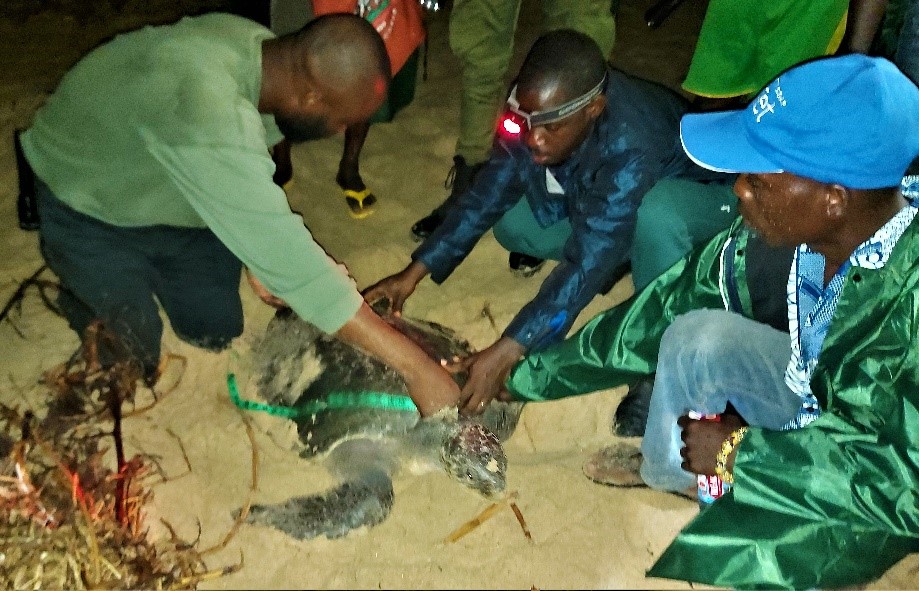
News from the field: The Development Institute
Published on 24 June 2021Enhancing Territorial Governance, Sea Turtle Conservation and Sustainable livelihood within the Anlo-Keta Lagoon Ramsar (Ghana)
The Development Institute-Story
The Anlo-Keta Lagoon Complex Ramsar Site (AKLCRS) is located in the Volta region of southeastern Ghana. It is the largest lagoon in Ghana. It has several different ecosystems such as brackish water, floodplains, swamps, mangroves and beautiful beaches. The site is home to significant biodiversity with about 80% of Ghana’s waterfowl, sea turtles (including Ghana’s three endangered species – the green, leatherback and olive ridley turtles) and the West African sitatunga. The leatherback turtle, recognized by the IUCN as critically endangered, is the most frequently observed species at the site.
The main problems related to biodiversity conservation in the AKLCRS are the lack of community involvement in governance and management processes, poaching, overexploitation of natural resources and the use of unsustainable livelihood practices.
PPI Project Overview
In order to support the conservation efforts of stakeholders such as the local Sea Turtle Conservation (STC) association and the Ghana Forestry Administration (Wildlife Division), DI designed a project focused on improving the governance and community management of the AKLCRS, as well as introducing alternative and sustainable forms of livelihood for the communities of Akplortorkor, Agbledomi, Atiteti, Fuveme, and Dzita, all in the Anloga District. This project has received support from BothEnd (Netherlands) and the French Committee of IUCN within the framework of PPI-5.
In this territory, we have opted for the CREMA (Community Resource Management Areas) approach developed by the forestry administration. It guarantees a win-win situation in which communities have the right to manage their natural resources in a sustainable manner. This approach has been tested over the years and has proven to be very effective.
COVID-19: A disrupted but never stopped start-up!
Even though our project started in a global context of concern and restrictions related to the COVID-19 pandemic, this did not stop us from moving forward. Our first actions were to ensure the safety of our beneficiaries. Each community received three sanitation kits that included hand washing devices (veronica buckets), soap, disinfectants, tissues, and masks. In addition, between April and June 2020, and with the permission of law enforcement agencies, we had the opportunity to hold awareness sessions prior to each community engagement session during which 250 participants were given extensive information about the Covid-19 virus and its mode of transmission.
Subsequently, to ensure that all stakeholders were at the same level of knowledge and skills, a series of capacity building workshops were held for all stakeholders. These included forest guards, women, fisheries leaders, traditional authorities, representatives of law enforcement agencies (navy and police), representatives of the Wildlife Division (WD) of the Forestry Commission, the judiciary and the district assembly. The capacity building workshops focused on three main areas: the CREMA model, laws governing sea turtle conservation (national and international), and the development of fish farming as an alternative source of income.
Our successes so far…
Through our project, all the communities in AKLCRS have reached a consensus on the collective establishment of a CREMA. The areas to be conserved have been delimited and mapped, indicating that the communities are now ready to conserve certain areas and use the resources sustainably for their own benefit and for the future.
After our intensive capacity building and sensitization sessions, the communities as well as other stakeholders are finally open to conservation and natural resource management. As a result, all stakeholders are now involved and taking the initiative to ensure the sustainability of natural resources.
A total of 25 youth volunteers, representing the five communities, have been successfully trained In marine turtle handling and protection by DI in collaboration with the Wildlife Division. Currently, there are five patrol teams (rangers) for each community, who monitor day and night to ensure the safety and protection of the sea turtles, their nesting areas and eggs. The first results are not yet known.
– 2 arrests were made and the accused are currently being prosecuted;
– 55 turtles were rescued (Made up of Olive Ridley, Leatherback and Green Turtle);
But that’s not all, thanks to the capacity building sessions organized for the law enforcement agencies, the laws are finally working and these agencies are working hand in hand with the communities to ensure sustainable resource management.
Finally, three fish farms (of about 260 cubic meter capacity each, holding up to about 2000 fish) have been set up in some of the project communities as an alternative source of income and in a few months, the fish market will be booming, giving the turtles a rest!

And in conclusion…
We understand that even though we have made some progress, we still have a lot of grounds to cover so even as we celebrate our wins, we are focused on going the long haul with this project. We can confidently say that we’re ready for an action packed 2021 with some more exciting activities such as mangrove restoration amongst others.